
Official Edgar Rice Burroughs Tribute and Weekly Webzine Site
Since 1996 ~ Over 10,000 Web Pages in Archive
Presents
Volume 5036

Official Edgar Rice Burroughs Tribute and Weekly Webzine Site
Since 1996 ~ Over 10,000 Web Pages in Archive
Presents
Volume 5036
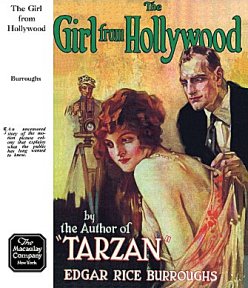
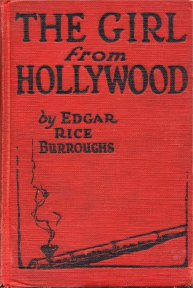
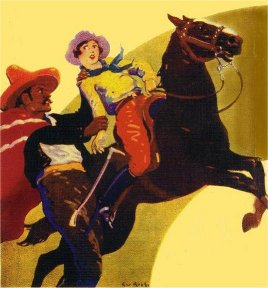
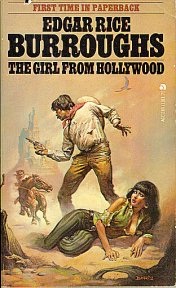
“Her mind is Tiffany twisted, she got the Mercedes bends
She got a lot of pretty, pretty boys she calls friends
How they dance in the courtyard, sweet summer sweat.
Some dance to remember, some dance to forget.”
– The Eagles, “Hotel California”We left Shannon in distress, fighting off Bartolo as he manhandles her. She has come to realize that the man does intend to rape and kill her in cold blood. I can’t tell you why she didn’t see this coming, but I sure bet she wishes that she had told someone that she was coming to this dangerous rendezvous. Still, Custer knows that she was going somewhere in the hills, but he could care less since she lied to him. Does she have any hope now that we are two thirds of the way through the story?
CHAPTER TWENTY-SIX
The Apache had taken but a few steps on the trail toward the east pasture when Custer reined him in suddenly and wheeled him about.Looks like Shannon isn’t the only likely contender for that year’s Darwin Awards. Why does Custer believe it is a good thing to confront a gang of cutthroat bootleggers without a weapon? Does he believe he is too angry to defend himself? Or is it to protect the woman he loves from being killed by his angry self?
“I’ll settle this thing now,” he muttered. “I’ll catch her with them. I’ll find out who the others are. By God, I’ve got her now, and I’ve got them!”
The cold rage that gripped Pennington brooked no delay. He was glad, though, that he was unarmed; for he knew that when he came face to face with the men with whom Shannon Burke had conspired against him, he might again cease to be master of his anger.At the summit they met Baldy, head and tail erect, snorting and riderless.This reminds me of a death penalty case I had to review when I was death penalty clerk for the Fresno branch of the Eastern District of California. Two white boys had killed a few illegal Mexicans at a dairy farm in Merced, kidnapping their woman and taking her up into the hills. One of them, the guy who got the death penalty, had taken her from the car, after they both had raped her in the back seat of the car, and off the road where he raped her again. Right before he orgasmed – as related by his partner in exchange for not getting the death penalty – he shot her in the head so that he could “feel her dying twitches” as he ejaculated. Wow, do you think that was enough to get him the death penalty? He couldn’t believe everyone took it so seriously because after all “they were nothing but a bunch of wetbacks!”
The appearance of the horse and his evident fright bespoke something amiss. Custer had seen him just as he was emerging from the upper end of the dim trail leading down the opposite side of the hogback. He turned the Apache into it and headed him down toward the oaks.
Below, Shannon was waging a futile fight against the burly Bartolo. She struck at his face and attempted to push him from her, but he only laughed his crooked laugh and pushed her slowly toward the trampled dust of the abandoned camp.
“Before I kill you –” he repeated again and again, as if it were some huge joke.In California, the death penalty is only for the worst of the worst, and believe me, this guy qualified and got the gas chamber, or was it lethal injection then? I can’t recall, but I didn’t grieve his death, because he surely deserved it. It’s people like him that make me still a believer in the death penalty, even though I find the economic arguments against it quite compelling.
I believe Bartolo has something similar in mind. But perhaps I’ve been hardened by all of the crime I’ve had to deal with in my career.
He heard the sound of the Apache’s hoofs upon the trail above but he thought it was the loose horse of the girl. Custer was almost at the bottom of the trail when the Mexican glanced up and saw him. With a curse, he hurled Shannon aside and leaped toward his pony.All right, I know what you are thinking: how come Custer didn’t retrieve the rifle and take a parting shot at Bartolo? Don’t ask me; I’m sure I would have thought of it. But ERB was more concerned in showing the dual feelings Custer had for the girl.
At the same instant the girl saw the Apache and his rider, and in the next she saw Bartolo seize his rifle and attempt to draw it from its boot. Leaping to her feet she sprang toward the Mexican, who was cursing frightfully because the rifle had stuck and he could not readily extricate it from the boot. As she reached him, he succeeded in jerking the weapon free. Swinging about, he threw it to his shoulder and fired at Pennington, just as Shannon threw herself upon him, clutching at his arms and dragging the muzzle of the weapon downward. He struck her face and tried to wrench the rifle from her grasp; but she clung to it with all the desperation that the danger confronting the man she love engendered.
Custer had thrown himself from the saddle and was running toward them. Bartolo saw that he could not regain the rifle in time to use it. He struck the girl a terrible blow in the face that sent her to the ground. Then he turned and vaulted into the saddle, and was away across the bottom and up the trail on the opposite side before Pennington could reach and drag him from his pony.
Custer turned to the girl lying motionless upon the ground. He knelt and raised her in his arms. She had fainted, and her face was very white. He looked down into it – the face of a girl he hated. He felt his arms about her, he felt her body against his, and suddenly a look of horror filled his eyes.
He laid her back on the ground, and stood up. He was trembling violently. As he had held her in his arms, there had swept over him an almost irresistible desire to crush her to him, to cover her eyes and cheeks with kisses, to smother her lips with them – the girl he hated!A great light had broken upon his mental horizon – a light of understanding that left all his world in the dark shadow of despair. He loved Shannon Burke.When I was six years old, living in Kansas City, Kansas – let’s see, that was in 1953 – I used to sit in front of our new television and watch old B Westerns in the afternoon. One part that always gave me great joy – and I can still feel it even today – is when one of my favorite cowboys would whistle to his horse and it would immediately come to him. Later, I got the same kind of joy whenever Tarzan would give his famous cry and the whole animal kingdom would show up on his command. I hope I am not in a small minority when it comes to sharing this kind of joy. I just felt it again when Custer whistled for the Apache.
Again, he knelt beside her, and very gently he lifted her in his arms until he could support her across one shoulder. Then he whistled to the Apache, who was nibbling the bitter leaves of the live oak. When the horse came to him, he looped the bridle reins about his arm and started on foot up the trail down which he had just ridden, carrying Shannon across his shoulder. At the summit of the ridge he found Baldy grazing upon the sparse, burned grasses of later September.And I don’t know about you, but I imagine Shannon’s blouse to be torn and ripped open, exposing some under garment, as well as having a swollen and busted lip from being punched in the face. Is that too much?
It was then that Shannon Burke opened her eyes. At first, confused by the rush of returning recollections she thought that it was the Mexican who was carrying her; but an instant later she recognized the whipcord riding breeches and the familiar boots and spurs of the son of Ganado. Then she stirred upon his shoulder.
“I am all right now,” she said. “You may put me down. I can walk.”
He lowered her to the ground, but he still supported her as they stood facing each other.
“You came just in time,” she said. “He was going to kill me.” “I’m glad I came,” was all that he said.
She noticed how tired and pinched Custer’s face looked, as if he had risen from a sick bed after a long period of suffering. He looked older – very much older – and oh, so sad! It wrung her heart; but she did not question him. She was waiting for him to question her, for she knew that he must wonder why she had come here, and what the meaning of the encounter he had witnessed; but he did not ask her anything, beyond inquiring whether she thought she was strong enough to sit her saddle if he helped her mount.
“I shall be all right now,” she assured him.
He caught Baldy and assisted her into the saddle. Then he mounted the Apache and led the way along the trail toward home. They were halfway across the basin meadow before either spoke. It was Shannon who broke the silence.
“You must have wondered what I was doing up there,” she said, with a backward nod of her head.
“That would not be strange, would it?”
“I will tell you.”
“No,” he said, “it is bad enough that you went there today and the Saturday before I was arrested. Anything more that you could tell me would only make it worse.”
“But I must tell you, Custer,” she insisted. “Now that you have learned this much, I can see that your suspicions wrong me more than I deserve. I came here the Saturday before you were arrested to warn them that you were going to watch for them on the following Friday. Though I did not know the men, I knew what sort they were, and that they would kill you the moment they found they that they were discovered. It was only to save your life that I came that other time, and this time I came to try to force them to go before the grand jury and clear you of the charge against you; but when I threatened the man, and he found what I knew about him, he said that he would kill me.”
“You did not know that I was going to be arrested that night?”
“Oh, Custer, how could you believe that of me?” exclaimed Shannon. “I came into all this information – about the work of this gang – by accidentally overhearing a conversation in Hollywood, months ago. I know the names of the principals. I know Guy’s connection with them. Today I was trying to keep Guy’s name out, too, if that were possible; but he is guilty and you are not. I cannot understand how he could have come back from Los Angeles without telling them the truth and removing the suspicion from you.” “I would not let him,” said Pennington.
“You would not let him? You would go to the penitentiary for the crime of another?”
“Not for him, but for Eva. Guy and I thrashed it all out. He wanted to give himself up – he almost demanded that I should let him; but it can’t be done. Eva must never know.”
“But, Custer, you can’t go! It wouldn’t be fair – it wouldn’t be right. I won’t let you go! I know enough to clear you, and I shall go before the grand jury on Wednesday and tell all I know.”
“No,” he said. “You must not. It would involve Guy.”
“I won’t mention Guy.”
“But you will mention others, and they will mention Guy – don’t doubt that for a minute.” He turned suddenly toward her. “Promise me, Shannon, that you will not go – that you will not mention what you know to a living soul. I would rather go to the pen for twenty years that see Eva’s life ruined.
“Perhaps you are right, but it seems to me she would not suffer any more if Guy went that if her brother went. She loves you very much.”
“But she will know that I am innocent. If Guy went, she would know that he was guilty.” Shannon had no answer to this, and they were silent for a while.
“You will help me to keep this from Eva?” he asked.
“Yes.” Shannon felt his eyes upon her, and looked up. “You have been good to me, Custer, all of you – you can never know how I have valued the friendship of the Penningtons, or what it has meant to me, or how I have striven to deserve it. I would have done anything to repay a part, at least, of what it has done for me. That was what I was trying to do – that is why I wanted to go before the grand jury, no matter what the cost to me; but I failed, and perhaps I have only made it worse. I do not even know that you believe me.”
“I believe you, Shannon,” he said. “There is much that I do not understand; but I believe that what you did was done in our interests. There is nothing more that any of us can do now but keep still about what we know, for the moment one of those actually responsible is threatened with exposure Guy’s name will be divulged – you may rest assured of that. They would be only too glad to shift the responsibility to his shoulders.”
“But you will make some effort to defend yourself?”
“I shall simply plead not guilty, and tell the truth about why I was up there when the officers arrested me.”
“You will make no other defense?”
“What other defense can I make that would not risk incriminating Guy?” Custer asked her.
She shook her head. It seemed quite hopeless.
CHAPTER TWENTY-SEVEN
Federal officers, searching the hills found the camp above Jackknife Canyon. They collected a number of empty bottles bearing labels identical with those found in Custer Pennington’s room. That was all they discovered, except that the camp was located on the Pennington property.This sentence tells me that Custer had a really great trial attorney and a very understanding judge. He got the bare minimum of what he could have gotten, perhaps even getting a felony reduced to a misdemeanor, which the six months in the county jail indicates to me. But without being able to prove his intent at the time, he was stuck with the possession of stolen property charge.
On the 12th of October Custer Pennington was found guilty and sentenced to six months in the county jail for having several hundred dollars’ worth of stolen whisky in his possession. He was neither surprised nor disheartened. His only concern was for the surprised sensibilities of his family, and these – represented at the trial in the person of his father – seemed far from overwhelmed for the Colonel was unalterably convinced of his son’s innocence.Eva, who had remained at home with her mother, was more deeplyAnd thus was fashioned the power he used to force her to his will.
affected than the others, though through a sense of injustice rather than of shame.
“You are taking it much too hard, dear,” said her mother. “One would think that our boy was really guilty.”
“Oh, if he really were, I should kill myself!”
The only person, other than the officious reformers, to derive any happiness from young Pennington’s fate was Slick Allen. He occupied a cell not far from Custer’s, and there were occasions when they were thrown together. Several times Allen saw fit to fling gibes at his former employer, much to the amusement of his fellows. They were usually indirect.
One day, as Custer was passing, Allen remarked in a loud tone:
“There’s a lot more of these damn fox-trottin’ dudes that put on airs, but ain’t nothin’ but common thieves!”
Pennington turned and faced him.
“You remember what you got the last time you tried calling me names, Allen? Well, don’t think for a minute that just because we’re in jail I won’t hand you the same thing again some day, if you get too funny. The trouble with you, Allen, is that you are laboring under the misapprehension that you are a humorist. You’re not, and if I were you I wouldn’t make faces at the only man in this jail who knows about you, and Bartolo, and – Gracial. Don’t forget Gracial!”
Allen paled, and his eyes closed to two very narrow slits. He made no more observations concerning Pennington; but he devoted much thought to him, trying to arrive at some reasonable explanation of the man’s silence, when it was evident that he must have sufficient knowledge of the guilt of others to clear himself of the charge upon which he had been convicted.
One of the first things to do, when he was released from jail, would be to do away with Bartolo. Bartolo disposed of, the other witnesses would join with Allen to lay the guilt upon the departed. Such pleasant thoughts occupied the time and mind of Slick Allen, as did also his plans for paying one Wilson Crumb a little debt he felt due this one-time friend.
Nor was Crumb free from apprehension for the time that would see Allen’s jail sentence fulfilled.
He knew enough of Allen’s activities to send the man to a Federal prison for a long term, but these matters he could not divulge without equally incriminating himself. There was, however, one little item of Allen’s past which might be used against him without signal danger to Crumb, and that was the murder of Gracial. It would not be necessary for Crumb to appear in the matter at all. An anonymous letter to the police would suffice.
With natural predilection of the weak for avoiding or delaying the consummation of their intentions, Crumb postponed the writing of this letter of accusation. There was no cause for hurry, he argued, since Allen’s time would not expire until the 6th of the following August. Crumb led a lonely life after the departure of Gaza.
That Gaza de Lure had successfully thrown off the fetters into which he had tricked her never for a moment entered his calculations. Finally, however, it was borne in upon him that there was little likelihood of her returning; and so depressing had become the familiar and suggestive furnishing of the Vista del Paso bungalow that he at last gave it up. He took with him, carefully concealed in a trunk, his supply of narcotics – which he did not find so easy to dispose of since the departure of his accomplice.
During the first picture in which Grace Evans had worked with him, Crumb had become more and more impressed with her beauty and the subtle charm of her refinement, which appealed to him by contrast with the ordinary surroundings and personalities of the K.K.S. studio. There was a great restfulness about her which soothed his diseased nerves, and after Gaza’s desertion he found himself more and more seeking her society. As was his accustomed policy, his attentions were at first so slight, and increased by such barely perceptible degrees, that, taken in connection with his uniform courtesy, they gave the girl no warning of his ultimate purposes.
In much the same manner that he had tricked Gaza de Lure, he tricked Grace Evans into the use of cocaine; and after that the rest was easy. Renting another and less prestigious bungalow on Circle Terrace, he installed the girl there, and transferred the trunk of narcotics to her care, retaining his room at the hotel for himself.
One evening, toward the middle of October, they were dining together at the Winter Garden. Crumb had bought an evening paper on the street, and was glancing through it as they sat waiting for their dinner to be served. Presently he looked up at the girl seated opposite him.
“Didn’t you come from Ganado?” he asked.
She nodded affirmatively.
“Why?”
“Here’s a guy from there been sent up for bootlegging – fellow by name of
Pennington.”
She half closed her eyes, as if in pain.
“I know,” she said. “It has been in the newspapers for the last couple of weeks.”
“It isn’t Pennington who ought to be in jail,” he said. “It’s your brother.” She looked at him in surprise, and then she laughed.
“You must have been hitting it up strong today, Wilson,” she said.
“Oh, no, I haven’t; but it’s funny I never thought of it before. Allen told me a long while ago that a fellow by the name of Evans was handling the hootch for him. He said he got a job from the Penningtons as stable man in order to be near the camp where they had the stuff cached in the hills. He described Evans as a young blood, so I guess there isn’t any doubt about it. You have a brother – I’ve heard you speak of him.”
“I don’t believe you,” she said.
“It don’t make any difference whether you believe me or not. I could put your brother in the pen, and they’ve only got Pennington in the county jail. All they could get on him, according to this article, was having stolen goods in his possession; but your brother was in on the whole proposition. It was hidden in the hay barn. He delivered it to a fellow who came up there every week, ostensibly to get hay, and your brother collected the money. Gosh, they’d send him up for sure if I ever tipped them off to what I know!’We can well imagine a sex slave type of relationship between Grace and Crumb from this time forward. That he took her maiden-head at this time, if he hadn’t already, can be surmised later in the story.
CHAPTER TWENTY-EIGHT
Custer’s long hours of loneliness had often been occupied with plans against the day of his liberation. That Grace had not seen him or communicated with him since his arrest and conviction had been a source of wonder and hurt to him. He recalled many times the circumstances of the telephone call, with a growing belief that Grace had been there, but had refused to talk with him.Don’t you just love these kinds of scenes? There are so many secrets that everyone is hiding, it becomes almost impossible for any one to be honest with one another any longer. Custer is discovering that he is engaged to a junkie. We are also not told how she was dressed, but I imagine it was in some sort of negligee, the kind that Gaza de Lure used to wear. Crumb would want his sex slave to dress like that.
Nevertheless, he was determined to see her before he returned to Ganado.
The woman who answered his ring told him that Grace no longer lived there. At first she was loath to give him any information as to the girl’s whereabouts; but after some persuasion she gave him a number on Circle Terrace, and in that direction Pennington turned his car.
As he left his car before the bungalow, and approached the building, he could see into the interior through the screen door, for it was a warm day in April, and the inner door was open. As he mounted the few steps leading to the porch, he saw a woman cross the living room, into which the door opened. She moved hurriedly, disappearing through a doorway opposite and closing the door after her. Though he had but a brief glimpse of her in the darkened interior, he knew that it was Grace, so familiar were every line of her figure and every movement of her carriage.
Crossing the living room, Custer rapped on the door through which he had seen Grace go, calling her by name. Receiving no reply, he flung open the door.
Facing him was the girl he was engaged to marry.With her back against the dresser, Grace stood at the opposite end of the room. Her dishevelled hair fell about her face, which was overspread with a sickly pallor. Her wild, staring eyes were fixed upon him. Her mouth, drooping at the corners, tremulously depicted a combination of terror and anger.Surely by now you saw that one coming. Isn’t ERB relentless in his sadistic ways? How can he make things possibly worse for the Penningtons?
“Grace!” he exclaimed.
She still stood staring at him for a moment before she spoke.
“What do you mean,” she demanded at last, “by breaking into my bedroom? Get out! I don’t want to see you. I don’t want you here!” He crossed the room and put a hand upon her shoulder.
“You mean that you don’t want me here, Grace? That you don’t love me?” he asked.
“Love you?” She broke into a disagreeable laugh. “Why you poor rube. I never want to see you again!”
He stood looking at her for a moment longer, and then he turned slowly and walked out of the bungalow and down to his car. When he had gone, the girl threw herself face down upon the bed and burst into uncontrollable sobs. For the moment she had risen triumphant above the clutches of her sordid vice. For that brief moment she had played her part to save the man she loved from greater torture and humiliation in the future – at what a price only she could ever know.
Custer found them waiting for him on the east porch as he drove up to the ranch house.
Eva was the first to reach him. She fairly threw herself upon her brother, laughing and crying in a hysteria of happiness. His mother was smiling through her tears, while the Colonel blew his nose violently, remarking that it was “a hell of a time of year to have a damned cold!”
Custer was surprised that Guy and Mrs. Evans had not been of the party that welcomed his return. When he mentioned this, Eva told him that Mrs. Evans thought the Penningtons would want to have him all to themselves for a while, and that their neighbors were coming up after dinner. And it was not until after dinner that he asked after Shannon.
“We have seen very little of her since you left,” explained his mother. “She returned Baldy soon after that, and bought the Senator from Mrs. Evans. “Eva has missed her company very much,” said Mrs. Pennington. “I was afraid that we might have done something to offend her, but none of us could think what it could have been.”
“I thought she was ashamed of us,” said Eva.
“Nonsense!” exclaimed the Colonel.
“Of course that’s nonsense,” said Custer. “She knows as well as the rest of you that I was innocent.”
He was thinking how much more surely Shannon knew his innocence than any of them.
During dinner Eva regained her old-time spirit. More than once the tears came to Mrs. Pennington’s eyes as she realized that once more their little family was united, and that the pall of sorrow that had outweighed so heavily upon them for the past six months had at last lifted, revealing again the sunshine of the daughter’s heart, which had never been the same since their boy had gone away.
“Oh, Cus!” exclaimed Eva. “The most scrumptious thing is going to happen, and I’m so glad that you are going to be here too. They’re going to take a picture on Ganado.”
Custer turned toward his father with a look of surprise.
“You needn’t blame papa,” said Eva. “It was all my fault – or, rather, I should say our good fortune is all due to me. You see, papa wasn’t going to let them come at first, but the cutest man came up to see him – a nice, short, fat little man, and he rubbed his hands together and said ‘Vell, Colonel?’ Papa told him that he had never allowed any picture companies on the place; but I happened to be there, and that was all that saved us, for I teased and teased until finally papa said that they could come, provided they didn’t take any pictures up around the house. They didn’t want to do that, for they’re making a Western picture, and they said the scenery at the back of the ranch is just what they want. They’re coming up in a few days, and it’s going to be perfectly radiant, and maybe I’ll get in the pictures!”
“What outfit is it?” asked the son.
“It’s a company from the K.K.S. directed by a man by the name of Crumb.”It was after eight o’clock when the Evanses arrived. Mrs. Evans was genuinely affected at seeing Custer again, for she was as fond of him as if he had been her own son. In Guy, Custer had discovered a great change. The boy he had left had become suddenly a man, quiet and reserved, with a shadow of sadness in his expression. His lesson had been a hard one, Custer knew, and the price that he had had to pay for it had left its indelible mark upon his sensitive character.This is a good place to break off for this installment. I think we have been given some idea of what to expect from here on, but we must still give ERB some credit for having a few more tricks up his sleeve.
The first greetings over, Mrs. Evans asked Custer if had seen Grace before he left Los Angeles.
“I saw her,” he said, “and she is not all well. I think Guy should go up there immediately and try to bring her back. I meant to speak to him about it this evening.”
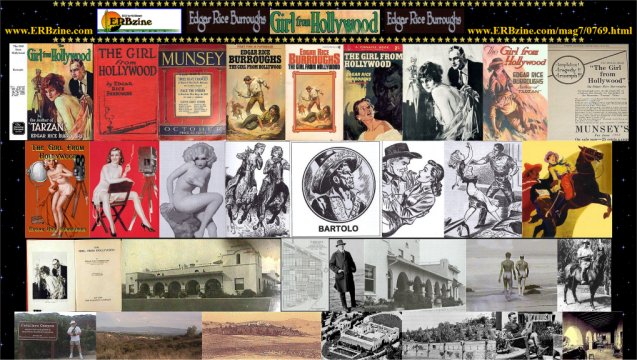
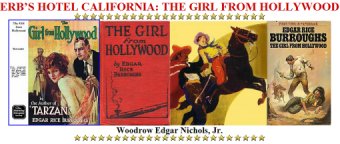
Read
The
Girl From Hollywood Text in ERBzine
See
the ERBzine Bibliography Entry
BACK TO EDGAR RICE
BURROUGHS' TARZANA RANCH 1921 - Docu/Novel
.
![]()
INTRODUCTORY AND CONTENTS PAGE
FOR
THE EDGAR RICE BURROUGHS ARTICLES
BY WOODROW EDGAR NICHOLS, JR.
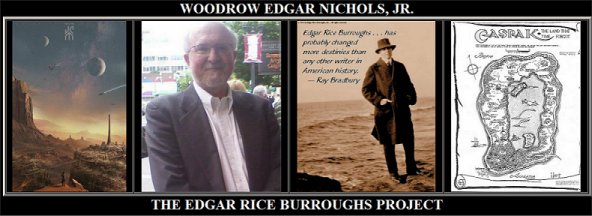
www.ERBzine.com/nichols
|
|
THE TRIMESTERS OF CASPAK |
|
by Woodrow Edgar Nichols, Jr. INTRODUCTION and CONTENTS |
![]()

![]()

BILL
HILLMAN
Visit
our thousands of other sites at:
BILL
AND SUE-ON HILLMAN ECLECTIC STUDIO
All
ERB Images© and Tarzan® are Copyright ERB, Inc.- All Rights Reserved.
All
Original Work © 1996-2014 by Bill Hillman and/or Contributing Authors/Owners
No
part of this web site may be reproduced without permission from the respective
owners.